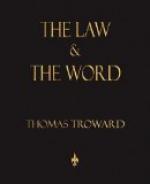To quote Dryden’s words—but in a very different sense to that intended in “Absolom and Achitophel,”—such a one must be “Not one, but all Mankind’s epitome.” The manifestation must be the Perfect Expression of that fundamental Life which is the Root Desire in us all, and which is therefore called “The Desire of all nations.”
Here then we have reached (Haggai ii, 7) the foundation fact of Human Personality. It is the Eternal “Will-to-live,” as Schopenhauer calls it, which works subconsciously in all creation; therefore it is the root from which all creation springs. In the atom it becomes atomic energy, in the plant it becomes vegetable life, in the animal it becomes animal life, and in man it becomes personal life, and therefore, if a Perfect Standard of the Eternal Life is to be set before us, it must be in terms of Human Personality.
But some one will say: Why should we need such a Standard? The answer is that since the working of the Law towards each of us is determined by our mode of Thought, we require to be guarded against an inverted use of the Word. “Ignorantia Legis nemini excusat” (ignorance of the Law does not excuse you from its operation), is a scientific, as well as a forensic maxim, for the Law of Cause and Effect can never be altered. Our ignorance of the laws of electricity will not prevent us from being electrocuted if we get into the circuit of some powerful voltage.
Therefore, because the Law is Impersonal and knows no exceptions, and will bring us either Life or Death according to the direction which we give it by our Word, it is of the first importance for us to have a Standard by which to measure the Word expressed through our own Personality. This is why St. Paul speaks of our growing to “the measure of the stature of the fulness of Christ,” (Eph. iv, 13) and why we find the symbol of “Measurement” so frequently employed in the Bible.
Therefore, if a great scale of measurement for our Word is to be exhibited, it can only be by its presentation in human form.
Then if the purpose be to establish such a standard of measurement, the scale must be expressed in units of the same denomination as that of our own nature—you cannot divide miles by amperes—and it is because the scale of our potential being is laid out in the same denomination as that of the Spirit of Life itself that we can avail ourselves of the standard of “the Word made Flesh.”
When this is clearly seen it removes those intellectual difficulties which so many feel with regard to the doctrine of the Atonement. If we want to avail ourselves of the Bible Promises on the basis of the Bible teaching, we cannot throw the teaching overboard. As I have said before, if a doctrine is to be rightly interpreted, it must be interpreted as a whole, and in one form or another the doctrine of the Atonement is the pivot point of the whole Bible. To omit it is like trying to play “Hamlet” with Hamlet left out, and you may put your Bible out on the rubbish-heap. How, then, does the Atonement come in?




